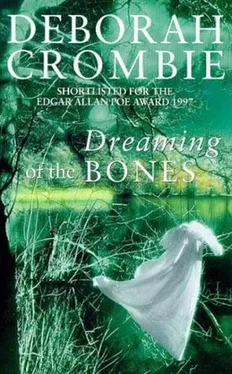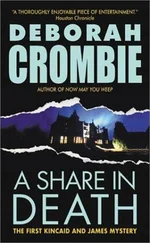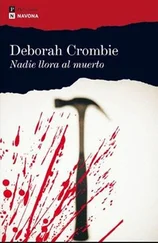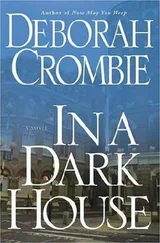Deborah Crombie - Dreaming of the bones
Здесь есть возможность читать онлайн «Deborah Crombie - Dreaming of the bones» весь текст электронной книги совершенно бесплатно (целиком полную версию без сокращений). В некоторых случаях можно слушать аудио, скачать через торрент в формате fb2 и присутствует краткое содержание. Жанр: Детектив, на английском языке. Описание произведения, (предисловие) а так же отзывы посетителей доступны на портале библиотеки ЛибКат.
- Название:Dreaming of the bones
- Автор:
- Жанр:
- Год:неизвестен
- ISBN:нет данных
- Рейтинг книги:3 / 5. Голосов: 1
-
Избранное:Добавить в избранное
- Отзывы:
-
Ваша оценка:
- 60
- 1
- 2
- 3
- 4
- 5
Dreaming of the bones: краткое содержание, описание и аннотация
Предлагаем к чтению аннотацию, описание, краткое содержание или предисловие (зависит от того, что написал сам автор книги «Dreaming of the bones»). Если вы не нашли необходимую информацию о книге — напишите в комментариях, мы постараемся отыскать её.
Edgar Awards (nominee)
Macavity Awards
Dr Victoria McClellan is writing a biography of the tortured poet Lydia Brooke, five years after Brooke's tragic suicide. Victoria becomes immersed in Lydia's life – she cannot believe the poet died by her own hand. So she calls her SI ex-husband for help in the case who receives terrible news…
Dreaming of the bones — читать онлайн бесплатно полную книгу (весь текст) целиком
Ниже представлен текст книги, разбитый по страницам. Система сохранения места последней прочитанной страницы, позволяет с удобством читать онлайн бесплатно книгу «Dreaming of the bones», без необходимости каждый раз заново искать на чём Вы остановились. Поставьте закладку, и сможете в любой момент перейти на страницу, на которой закончили чтение.
Интервал:
Закладка:
Nathan shrugged. “I suppose that’s the logical explanation. Or perhaps at some level she was hoping to be rescued.”
“As Adam rescued her the first time?”
“Poor Adam. At least I didn’t find her floating in her own blood. Sorry, love,” he added with a grimace. “Not a nice picture.”
“She wrote about it- Life blood/Salt and iron/cradle gentle as a/mother’s kiss …” Vic recited softly. She stood up and went to the old gramophone cabinet Nathan used to store drinks in the sitting room. Pouring herself a generous sherry, she said, “What did she say when she called you that day, Nathan? How did she sound?”
He thought for a long moment. “Tense… excited… almost combative. I suppose all of those would be natural if she were working herself up to suicide.”
“But what exactly did she say? Can you remember the particular words or phrases?” Vic came back to her chair and curled up with her feet beneath her.
Nathan closed his eyes, then said slowly, “She said, ‘Nathan, I simply must see you. Can you come round this evening?’ And then she said, ‘We need to talk.’ Or was it, ‘There’s something I need to talk to you about’?” He shook his head. “I’m sorry, I can’t remember.”
“And then what did she say? When she rang off?”
“Oh, Lord.” Nathan rubbed his chin. “Let me think. She said, ‘Come for drinks round sevenish?’ A question, rather than a statement, but she didn’t wait for me to answer. And then, ‘See you then. Cheerio,’ and she hung up.”
“And you thought that sounded like someone intending suicide?” Vic’s voice rose to an incredulous squeak.
“Well, I have to admit it sounds a bit absurd now,” said Nathan, exasperated. “But I had indisputable evidence, damnit. She was dead.”
“What did you think about the poem in the typewriter?” asked Vic, plowing on.
“The Rupert Brooke? I supposed she had never quite got over Morgan, and that was her way of saying good-bye to him. It did seem a bit sentimental for Lydia, but when I heard she’d left him everything it seemed a fair assumption.”
“The police thought Lydia wrote it.”
“Did they?” Nathan’s brows lifted in surprise. “Well, they never asked me. I’d have set them straight. But what difference does it make?”
Not yet, she thought. She wasn’t ready to lay her cards out quite yet. And there was still the matter of the poems. “Nathan, did you know about the poems in the book you gave me?”
“The Rupert Brooke? Of course it had poems in it,” he said, looking at her as if not quite sure of her sanity. “It was the first collection of his poems, along with Marsh’s rather sexually biased memoirs, if I remem-”
“No, no, I don’t mean those poems,” Vic protested, laughing. “I meant Lydia’s poems.”
Nathan just looked at her blankly. “What are you talking about, Vic?”
“Did you look in the book before you gave it to me?”
“Just the copyright page, and that marvelous photo on the flyleaf. No wonder Marsh-”
“That’s all right, then,” Vic said on a breath of relief. “No wonder you didn’t see them.” She proceeded to explain about finding the manuscript drafts of Lydia’s poems in the book, and that she thought them among the last of Lydia’s work.
When she’d finished, Nathan said thoughtfully, “Well, no one would know better than you. But how odd. I suppose the logical step would be to ask Ralph if he knows anything about them.”
“Ralph Peregrine? Her publisher?” she asked, while silently blessing Nathan for not questioning her competence.
“A nice chap, and he seems to have had a good working relationship with Lydia. Have you met him?”
Vic nodded. “Briefly. He was very accommodating. He told me as much as he knew about Lydia’s methods of working, and made me copies of his correspondence with her.”
“And there was nothing about these poems?”
“No. She wrote him a series of friendly, chatty letters from abroad over the years, but they seem to have conducted most of their business in person or over the telephone.”
“I suppose that makes sense, in view of the fact that they were both in Cambridge.” Nathan fell silent for a moment, then smiled brightly at her. “You could ask Daphne.”
“That’s exactly what Adam said, only about something else. What-”
“How did your visit go with Adam?” Nathan interrupted, sounding avuncularly pleased with himself.
“He wasn’t at all what I expected,” Vic said, smiling. “He was quite charming, and he gave me very good sherry. It seemed all I needed was your seal of approval.”
“Adam always did have a taste for expensive sherry-it’s probably the one little luxury he allows himself, poor chap. It was he who began the sherry party tradition at college, you know.” As if reminded of his empty glass, Nathan got up and poured himself a bit more whisky. Returning to his chair, he said, “Lydia took it up, but with a bit more flair. I’d forgotten that.”
“Why refer to him as a poor chap?” Vic asked, intrigued. “I’ll admit the rectory is a bit shabby-well, I suppose I’d have to admit that Adam’s a bit shabby himself-but he seemed quite comfortable with his circumstances.”
Nathan grimaced. “You’re quite right. That was bloody condescending of me. That’s what comes of projecting your own ambitions onto someone else.” Frowning, he sipped at his drink. “But you see, all of us-Adam and Darcy and I-came from the same sort of comfortable, middle-class background. Well, mine was a bit less comfortable than Adam’s or Darcy’s, but the point is, we started with the same aspirations, and Darcy and I made a moderate success of it. Adam, though…”
“What?” said Vic, her curiosity further aroused by his hesitation. He looked up at her and for once she found his dark eyes opaque, unreadable.
“All of a sudden, one day Adam decided that wasn’t good enough for him. He wanted to contribute something, save his own little corner of the world. And I can’t say he’s made a great success of it-a failed mission, then a decaying church that’s in danger of closure, full of aging and decrepit parishioners.”
“Nathan,” said Vic, taken aback, “you actually sound as if you’re jealous! I’d never have thought it.”
He looked at her for a long moment, then said, “It’s more guilt than jealousy, I’m afraid. At least he made an effort to do something for someone, poor bastard, while the rest of us just grew fat and content and more blind by the day. I used to tell myself that do gooding was just as self-serving, but I’m not sure I can swallow that anymore.”
“I wouldn’t have thought you’d make a very good cynic.”
“Thanks.” He smiled at her. “Perhaps your good opinion means I have some hope of redemption.”
“What about Daphne? Did she get a case of middle-aged tunnel vision, as well?”
“Daphne?” Nathan tilted his head to one side as he thought. “I’m afraid I couldn’t say, really. I never had much contact with Daphne after college. She’s certainly been outwardly successful, though.”
“But you said-”
“It was Lydia and Daphne who stayed close. And I must say I wondered even then if Daphne only put up with the rest of us for Lydia’s sake. It was Daphne who was most privy to Lydia’s work, especially in the later years.”
“But I interviewed her.” Vic slid her feet to the floor with an outraged thump. “From the way she talked, you’d have thought they’d hardly seen one another since college, a nodding-acquaintances-in-the-street sort of thing. And there’s no record in Lydia’s papers, except for the occasional mention in her letters to her mother-”
Читать дальшеИнтервал:
Закладка:
Похожие книги на «Dreaming of the bones»
Представляем Вашему вниманию похожие книги на «Dreaming of the bones» списком для выбора. Мы отобрали схожую по названию и смыслу литературу в надежде предоставить читателям больше вариантов отыскать новые, интересные, ещё непрочитанные произведения.
Обсуждение, отзывы о книге «Dreaming of the bones» и просто собственные мнения читателей. Оставьте ваши комментарии, напишите, что Вы думаете о произведении, его смысле или главных героях. Укажите что конкретно понравилось, а что нет, и почему Вы так считаете.












